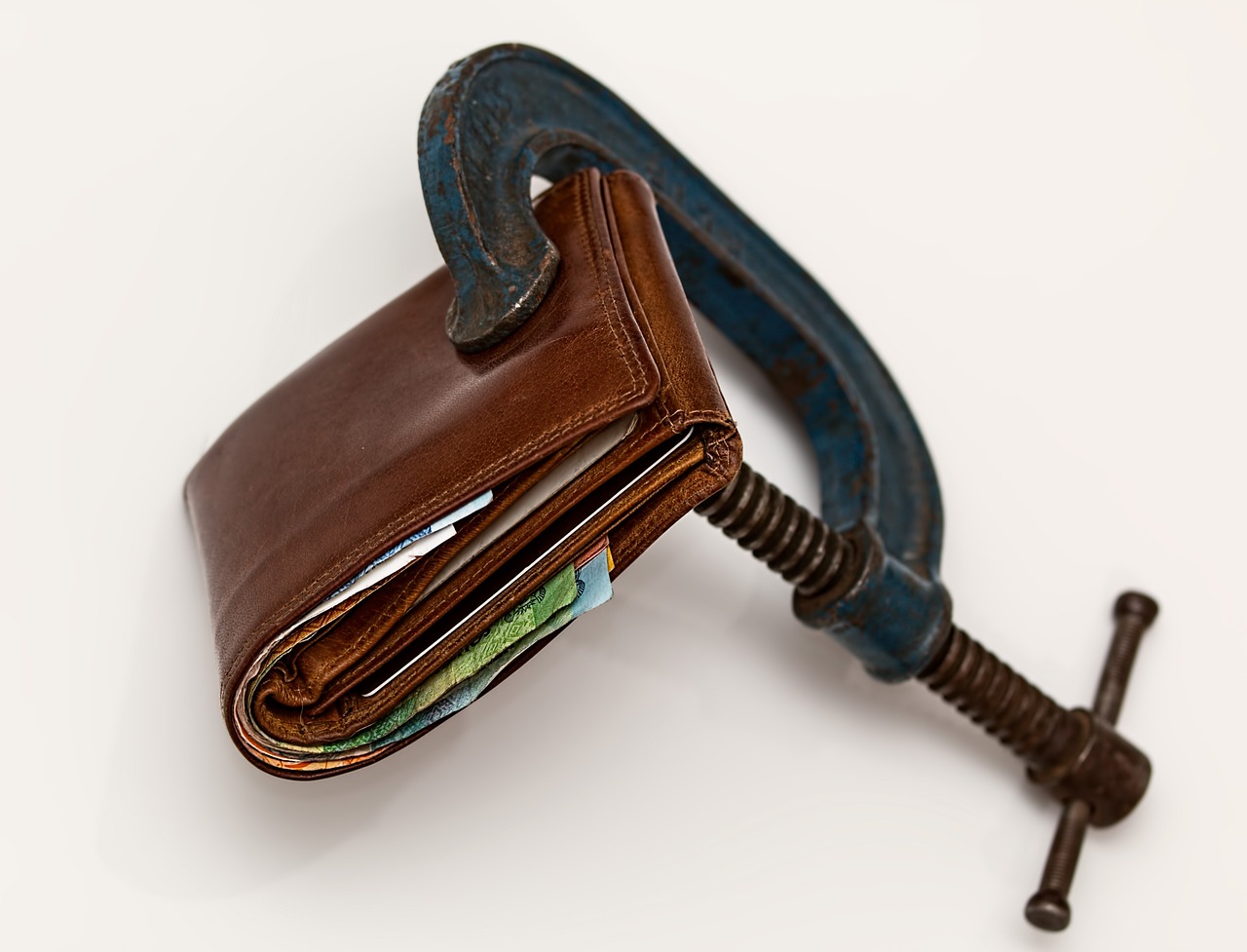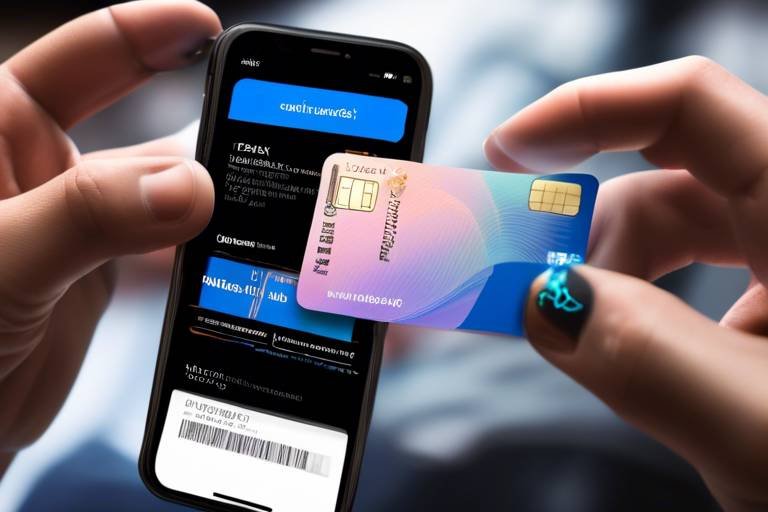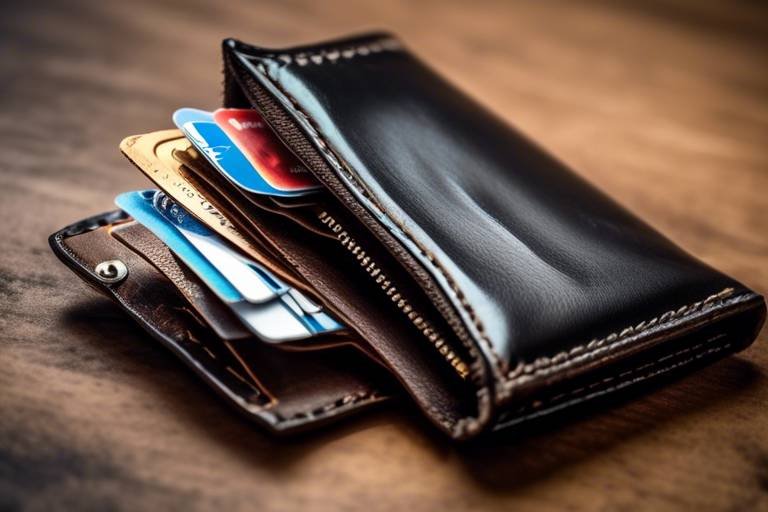The Impact of Crypto Wallets on Financial Inclusion
In today's fast-paced digital era, the concept of financial inclusion has taken center stage as we strive to create a world where everyone, regardless of their socio-economic status, has access to essential financial services. This is where crypto wallets come into play, acting as a beacon of hope for the unbanked and underbanked populations around the globe. Imagine being able to send money to a loved one across the world in seconds, without the need for a traditional bank. Sounds revolutionary, right? Well, that's exactly what crypto wallets are doing by providing a decentralized platform that empowers individuals to take control of their finances.
As we delve deeper into this topic, we will explore how these digital wallets not only facilitate transactions but also foster economic empowerment and innovation. By breaking down barriers that have long kept certain populations from accessing traditional banking services, crypto wallets are paving the way for a more inclusive financial landscape. So, how do they work, and what makes them so significant in the broader context of digital finance? Let's find out!
At their core, crypto wallets are digital tools that allow users to store, send, and receive cryptocurrencies. They come in various forms, including mobile apps, hardware devices, and web-based platforms, each offering unique features tailored to different user needs. For instance, a mobile wallet might be perfect for everyday transactions, while a hardware wallet provides enhanced security for long-term storage. The significance of these wallets extends beyond mere convenience; they represent a fundamental shift in how we perceive and interact with money.
In a world where traditional banking often feels inaccessible, crypto wallets serve as a bridge, connecting individuals to a global financial system. They enable users to engage in peer-to-peer transactions without the need for intermediaries, thus fostering a sense of autonomy and control over their financial lives. This democratization of finance is not just a trend; it's a movement that is reshaping our economic landscape.
According to recent estimates, approximately 1.7 billion people worldwide remain unbanked, meaning they do not have access to basic financial services. This staggering statistic highlights the urgent need for solutions that can address the challenges faced by these individuals. Many of them live in rural or remote areas where banks are scarce, or they may lack the necessary documentation to open an account. In such cases, crypto wallets can be a game changer.
So, what exactly are the barriers that prevent individuals from accessing traditional banking? Let's break it down:
- Geographical Limitations: Many individuals in rural areas find it difficult to access banks due to their physical locations. Crypto wallets eliminate this issue by allowing users to manage their finances from anywhere with an internet connection.
- Lack of Documentation: Traditional banks often require extensive documentation to open accounts, which can be a significant hurdle for many. Crypto wallets typically require minimal information, making them more accessible.
- High Transaction Fees: The costs associated with traditional banking can be prohibitive, especially for low-income individuals. Crypto wallets offer lower fees, making financial services more affordable.
For those living in remote areas, the absence of a physical bank branch can feel isolating. However, crypto wallets provide a decentralized solution, allowing users to access their funds and conduct transactions without needing to travel long distances. This is akin to having a bank in your pocket, ready to serve you anytime, anywhere.
Imagine sending money to a friend only to find that hefty fees eat away at your hard-earned cash. Traditional banking often incurs high transaction costs, which can be a significant barrier for low-income individuals. In contrast, crypto wallets operate with lower fees, promoting affordability and accessibility. It's like finding a hidden treasure where your money stretches further!
Across various regions, crypto wallets have successfully improved financial inclusion. For instance, in countries like Nigeria and Venezuela, where economic instability is prevalent, many individuals have turned to cryptocurrencies as a means of preserving their wealth and facilitating transactions. These real-world examples showcase the transformative potential of crypto wallets in empowering communities and fostering economic resilience.
The advantages of using crypto wallets extend far beyond mere convenience. They offer a plethora of benefits, including security, privacy, and ease of use. Let's dive into these aspects and explore how they contribute to financial inclusion.
Security is paramount when it comes to managing finances. Crypto wallets employ robust security measures, such as encryption and private keys, to protect users' assets. These features instill a sense of trust, particularly among underserved populations who may have experienced financial exploitation in the past. Knowing that their assets are secure allows individuals to engage with their finances confidently.
In an age where data privacy is a major concern, crypto wallets provide users with greater control over their funds. They allow individuals to engage in financial activities without excessive surveillance, offering a sense of freedom that traditional banking often lacks. It's like having a personal vault that only you can access, where your financial activities remain your business alone.
While the benefits of crypto wallets are compelling, it's essential to acknowledge the challenges and risks they present. Issues such as volatility in cryptocurrency values and cybersecurity threats can impact financial inclusion efforts. Users must navigate these complexities to ensure their financial security while embracing the opportunities that crypto wallets offer.
1. What is a crypto wallet?
A crypto wallet is a digital tool that allows users to store, send, and receive cryptocurrencies securely.
2. How do crypto wallets promote financial inclusion?
They provide access to banking services for unbanked individuals, allowing them to manage their finances without traditional banking barriers.
3. Are crypto wallets safe to use?
Yes, most crypto wallets use advanced security measures, but users should also practice good security hygiene.
4. Can anyone use a crypto wallet?
Yes, as long as you have internet access and a device to use, anyone can set up and use a crypto wallet.

Understanding Crypto Wallets
This article explores how crypto wallets can enhance financial inclusion by providing access to banking services for the unbanked and underbanked populations, fostering economic empowerment and innovation.
Crypto wallets are digital tools designed to facilitate the storage, sending, and receiving of cryptocurrencies. Think of them as a virtual bank account, but instead of holding traditional currency, they manage digital assets like Bitcoin, Ethereum, and many others. These wallets come in various forms, including software applications, hardware devices, and even paper formats, each serving the same fundamental purpose: to keep your crypto safe and accessible.
The significance of crypto wallets extends beyond mere convenience. They are a cornerstone of the broader digital finance ecosystem, enabling users to interact with a decentralized financial system. This system operates independently of traditional banks and financial institutions, allowing for greater flexibility and accessibility. Imagine being able to send money across the globe in seconds, without the need for intermediaries or hefty fees; that’s the power of crypto wallets!
Now, let’s break down how these wallets function. At their core, crypto wallets store your public and private keys. The public key is akin to your bank account number; it’s what you share with others to receive funds. On the other hand, the private key is your password, granting you access to your assets. Keeping this private key secure is crucial, as losing it means losing access to your funds. Here’s a quick overview:
| Key Type | Description |
|---|---|
| Public Key | Similar to a bank account number, used to receive funds. |
| Private Key | Like a password, used to access and manage your funds. |
Moreover, crypto wallets can be categorized into two main types: hot wallets and cold wallets. Hot wallets are connected to the internet, making them convenient for everyday transactions. However, their online nature can expose them to security risks. Cold wallets, on the other hand, are offline and offer enhanced security, making them ideal for long-term storage. Here’s a brief comparison:
- Hot Wallets: Easy access, suitable for frequent transactions, but less secure.
- Cold Wallets: Highly secure, best for long-term storage, but less convenient for quick access.
In summary, crypto wallets are not just tools; they represent a significant shift in how we think about money and finance. They empower individuals by providing a means to manage their assets without relying on traditional banking systems. As we delve deeper into the topic of financial inclusion, it’s essential to recognize the transformative potential these wallets hold, especially for those who have been historically excluded from the financial system.
A significant portion of the global population remains unbanked. This section highlights the challenges faced by these individuals and how crypto wallets can bridge the gap in financial services.
This subsection discusses the various obstacles that prevent access to traditional banking, including geographical limitations, lack of documentation, and high fees, which crypto wallets can help overcome.
Many individuals in rural or remote areas lack access to banks. Crypto wallets provide a decentralized solution, allowing users to manage their finances without needing a physical bank branch.
Traditional banking often incurs high transaction fees, making it difficult for low-income individuals to access services. Crypto wallets offer lower fees, promoting affordability and accessibility.
This section presents real-world examples of how crypto wallets have successfully improved financial inclusion in various regions, showcasing their potential impact on communities.
Crypto wallets offer numerous advantages, including security, privacy, and ease of use. This section explores these benefits in detail and their implications for financial inclusion.
The security measures in crypto wallets, such as encryption and private keys, protect users' assets. This subsection discusses how these features enhance trust among users, particularly in underserved populations.
Crypto wallets provide users with greater privacy and control over their funds. This section examines how these aspects empower individuals, allowing them to engage in financial activities without excessive surveillance.
Despite their benefits, crypto wallets come with challenges and risks, such as volatility and cybersecurity threats. This section analyzes these issues and their impact on financial inclusion efforts.
Q: What is a crypto wallet?
A: A crypto wallet is a digital tool that allows you to store, send, and receive cryptocurrencies.
Q: Are crypto wallets safe?
A: While they offer security features, users must take precautions, such as keeping their private keys secure.
Q: Can anyone use a crypto wallet?
A: Yes, anyone with internet access can create a crypto wallet, making it accessible to many, including the unbanked.

The Unbanked Population
Imagine waking up every day without access to a bank. For millions around the world, this is a reality. The unbanked population—those who do not have access to traditional banking services—faces a myriad of challenges that hinder their financial stability and growth. According to recent estimates, over 1.7 billion adults globally remain unbanked, which means they lack access to even the most basic financial services, such as savings accounts and credit options. This situation not only limits their ability to save money but also restricts their capacity to invest in opportunities that could improve their lives.
So, what are the challenges that keep these individuals from stepping into the world of traditional banking? One major hurdle is the lack of physical banking infrastructure in remote or rural areas. In many developing countries, bank branches are few and far between, making it incredibly difficult for individuals to access banking services. Without a nearby branch, the effort and cost of traveling to a bank can be prohibitive. This is where crypto wallets shine, providing a decentralized solution that allows users to manage their finances from anywhere with an internet connection.
Another significant barrier is the requirement for documentation. Many traditional banks require proof of identity, a permanent address, and sometimes even a minimum deposit to open an account. Unfortunately, many people in underbanked regions lack the necessary documents, effectively locking them out of the financial system. Crypto wallets, on the other hand, typically require only an internet connection to get started. This opens up a world of possibilities for those who have been excluded from traditional banking.
Additionally, the high transaction fees associated with traditional banking can be a major deterrent. For low-income individuals, every penny counts. Many banks charge fees for account maintenance, withdrawals, and transfers that can quickly add up, making it difficult for those on tight budgets to utilize banking services. In contrast, crypto wallets often have much lower fees, allowing users to send and receive funds without the worry of crippling costs. This affordability is crucial for fostering financial inclusion and empowering individuals to take control of their finances.
In summary, the unbanked population faces numerous challenges that limit their access to financial services. However, with the advent of crypto wallets, there is a glimmer of hope. By breaking down geographical barriers, simplifying documentation requirements, and reducing transaction fees, crypto wallets can serve as a powerful tool for financial inclusion, enabling individuals to take charge of their economic futures.
- What is a crypto wallet? A crypto wallet is a digital tool that allows users to store, send, and receive cryptocurrencies.
- How can crypto wallets help the unbanked? They provide access to financial services without the need for traditional banking infrastructure, documentation, or high fees.
- Are crypto wallets secure? Yes, most crypto wallets use encryption and private keys to protect users' assets, enhancing trust among users.

Barriers to Traditional Banking
The world of finance can often feel like an exclusive club, with traditional banking systems acting as gatekeepers. For many, accessing these services is akin to trying to enter a fortress without the right password. The barriers to traditional banking are numerous and complex, impacting millions of people globally. One of the most significant hurdles is geographical limitations. In many rural or remote areas, the nearest bank branch can be miles away, making it impractical for individuals to access banking services. Imagine living in a small village where the closest bank is a three-hour trek on a bumpy road; this is the reality for many unbanked individuals.
Another critical barrier is the lack of documentation. Traditional banks often require a plethora of identification documents to open an account. For those without formal identification—such as refugees, low-income individuals, or those living in unstable regions—this requirement can be insurmountable. It's like trying to get into a concert without a ticket; without the right documents, you're simply not allowed in.
Additionally, high transaction fees can act as a deterrent for low-income individuals. When every penny counts, the idea of paying a fee just to transfer money or maintain an account can feel unjust. Traditional banks often charge fees that can be a significant portion of a low-income individual's earnings. In contrast, crypto wallets present a more affordable alternative, allowing users to send and receive funds with minimal fees. This democratization of access to financial services is crucial for fostering economic empowerment.
To summarize, the barriers to traditional banking include:
- Geographical limitations: Many people live in areas without any banking facilities.
- Lack of documentation: Many potential users do not have the required identification to open bank accounts.
- High transaction fees: Costs associated with banking services can be prohibitive for low-income individuals.
By understanding these barriers, we can appreciate how crypto wallets can serve as a bridge, providing the unbanked and underbanked populations with the financial tools they need to thrive. They represent a shift from traditional, often exclusionary financial systems to a more inclusive and accessible future.

Geographical Limitations
In today's fast-paced world, where technology is advancing at lightning speed, it's hard to believe that millions of people still lack access to basic banking services. These individuals often reside in rural or remote areas, where traditional banks are few and far between. Imagine living in a place where the nearest bank branch is several hours away, or worse, non-existent. This geographical limitation creates a significant barrier to financial inclusion, leaving many stranded without the means to manage their money effectively.
Crypto wallets emerge as a beacon of hope in such scenarios. They provide a decentralized solution that allows users to manage their finances without needing to visit a physical bank. With just a smartphone and an internet connection, individuals can send and receive funds, pay for goods and services, and even save for the future—all without stepping foot inside a bank. This is revolutionary, especially for those in hard-to-reach areas where banking infrastructure is lacking.
Consider the following points that illustrate how crypto wallets can bridge the gap caused by geographical limitations:
- Accessibility: Crypto wallets can be accessed anywhere there is internet connectivity, allowing users in remote areas to engage in financial transactions from the comfort of their homes.
- Cost-Effectiveness: By eliminating the need for physical branches, crypto wallets reduce operational costs, which can translate to lower fees for users, making financial services more affordable.
- Empowerment: Individuals can take control of their financial futures, making decisions that best suit their needs without relying on traditional banking hours or locations.
Furthermore, the rise of mobile technology has significantly enhanced the potential for crypto wallets to reach those in isolated regions. With the increasing penetration of smartphones, even the most remote communities are becoming connected. This connectivity opens a world of possibilities, allowing users to participate in the global economy. They can send remittances to family members, receive payments for goods or services, and even invest in cryptocurrencies—all from their mobile devices.
However, it's essential to recognize that while crypto wallets offer a promising solution, they are not a panacea. The digital divide still exists, and not everyone has the necessary digital literacy to navigate these new technologies. Education and support are crucial to ensure that individuals can fully benefit from the opportunities presented by crypto wallets.
In summary, geographical limitations pose a significant challenge to financial inclusion, particularly for those living in remote areas. However, crypto wallets have the potential to overcome these barriers, providing individuals with the tools they need to manage their finances effectively. As we continue to explore the impact of crypto wallets on financial inclusion, it's crucial to address the accompanying challenges and ensure that everyone has the opportunity to participate in the digital economy.

High Transaction Fees
In the world of finance, one of the most significant barriers that low-income individuals face is the burden of . Traditional banking systems often impose hefty charges for various services, from account maintenance to money transfers. For someone living paycheck to paycheck, these fees can feel like a financial anchor, weighing them down and keeping them from accessing essential banking services. Imagine trying to pay your bills but finding that the cost of sending money to your landlord is almost as much as the rent itself! This scenario is a harsh reality for many people around the globe.
Crypto wallets, on the other hand, present a refreshing alternative. They operate on decentralized networks and typically offer significantly lower transaction fees compared to traditional banks. This affordability is crucial for individuals who are already struggling to make ends meet. By using a crypto wallet, users can transfer funds across borders at a fraction of the cost it would take through conventional banking channels. For instance, while a bank might charge $20 to send money internationally, a crypto transaction could cost less than a dollar. The difference is not just a number; it represents accessibility and economic empowerment for those who have been marginalized by the existing financial system.
Moreover, the transparency of blockchain technology ensures that users are aware of the fees involved before completing a transaction. This level of transparency is often missing in traditional banking, where hidden fees can surprise customers. With crypto wallets, users can enjoy a clear understanding of what they are paying for, allowing them to make informed decisions about their finances. In essence, the lower transaction fees associated with crypto wallets not only enhance financial inclusion but also foster a culture of trust and empowerment among users, enabling them to take control of their financial destinies.
To further illustrate the impact of high transaction fees, consider the following comparison of average fees for sending money internationally through traditional banking versus using a crypto wallet:
| Service | Average Fee |
|---|---|
| Traditional Bank Transfer | $20 - $50 |
| Crypto Wallet Transfer | $0.50 - $2.00 |
As seen in the table above, the cost differences are staggering. This stark contrast highlights not only the potential savings for users but also the broader implications for financial inclusion. By reducing transaction costs, crypto wallets can help the unbanked and underbanked populations participate in the economy more fully, allowing them to send money to family, pay for services, and engage in commerce without the fear of exorbitant fees.

Case Studies of Financial Inclusion
This article explores how crypto wallets can enhance financial inclusion by providing access to banking services for the unbanked and underbanked populations, fostering economic empowerment and innovation.
Crypto wallets are digital tools that allow users to store, send, and receive cryptocurrencies. These wallets come in various forms, including software applications, hardware devices, and even paper wallets. Their significance in the broader context of digital finance cannot be understated. By enabling individuals to manage their digital assets, crypto wallets facilitate transactions that transcend traditional banking barriers.
A significant portion of the global population remains unbanked. According to the World Bank, around 1.7 billion adults do not have access to a bank account. This section highlights the challenges faced by these individuals and how crypto wallets can bridge the gap in financial services.
Many individuals are unable to access traditional banking services due to various obstacles. These barriers include geographical limitations, lack of documentation, and high fees, all of which crypto wallets can help overcome.
Many individuals in rural or remote areas lack access to banks. Crypto wallets provide a decentralized solution, allowing users to manage their finances without needing a physical bank branch. For instance, in regions where banking infrastructure is scarce, a simple smartphone and internet connection can empower people to perform transactions, pay bills, and even receive remittances.
Traditional banking often incurs high transaction fees, making it difficult for low-income individuals to access services. Crypto wallets offer lower fees, promoting affordability and accessibility. This is particularly crucial for those who rely on remittances; high fees can significantly reduce the amount received by families in need.
Real-world examples illustrate the transformative potential of crypto wallets in enhancing financial inclusion. In countries like Kenya, mobile money services such as M-Pesa have already demonstrated how digital financial solutions can empower the unbanked. Crypto wallets could take this a step further by providing a decentralized alternative that doesn't rely on traditional financial institutions.
In Venezuela, where hyperinflation has rendered the national currency nearly worthless, many citizens have turned to cryptocurrencies as a means of preserving value and conducting transactions. By utilizing crypto wallets, individuals can store their wealth in more stable digital currencies, bypassing the challenges posed by an unstable economic environment.
Another notable example can be found in the Philippines, where a significant portion of the population remains unbanked. Crypto wallets have started to gain traction as a means for individuals to receive remittances from abroad. According to a local study, using crypto wallets for remittances has reduced transaction times and costs, allowing families to access funds more quickly and affordably.
These case studies highlight the potential of crypto wallets to not only provide financial services but also to foster economic empowerment and innovation in communities that have been historically underserved. By leveraging the power of blockchain technology, crypto wallets can help individuals take control of their financial futures.
Crypto wallets offer numerous advantages, including security, privacy, and ease of use. This section explores these benefits in detail and their implications for financial inclusion.
The security measures in crypto wallets, such as encryption and private keys, protect users' assets. This subsection discusses how these features enhance trust among users, particularly in underserved populations.
Crypto wallets provide users with greater privacy and control over their funds. This section examines how these aspects empower individuals, allowing them to engage in financial activities without excessive surveillance.
Despite their benefits, crypto wallets come with challenges and risks, such as volatility and cybersecurity threats. This section analyzes these issues and their impact on financial inclusion efforts.
- What is a crypto wallet? A crypto wallet is a digital tool that allows users to store, send, and receive cryptocurrencies securely.
- How do crypto wallets enhance financial inclusion? They provide access to banking services for unbanked populations, allowing them to manage finances without traditional banking barriers.
- Are there risks associated with using crypto wallets? Yes, risks include market volatility and cybersecurity threats, which users should be aware of.
- Can crypto wallets replace traditional banking? While they offer many benefits, they are not a complete replacement but rather an alternative that can complement traditional banking services.

Benefits of Crypto Wallets
Crypto wallets are more than just digital storage for cryptocurrencies; they are gateways to a new financial reality. One of the most significant benefits of crypto wallets is their security. Unlike traditional banking systems, which can be vulnerable to hacks and fraud, crypto wallets utilize advanced security measures like encryption and private keys to safeguard users' assets. This level of security is particularly crucial for individuals in underserved communities who may not have access to robust banking protections. The sense of trust that comes from knowing your funds are secure can be a game-changer, encouraging more people to participate in the digital economy.
Moreover, crypto wallets provide a level of privacy and autonomy that traditional banking systems often lack. In a world where personal data is frequently exploited, having control over one’s financial activities can feel liberating. With crypto wallets, users can engage in transactions without the prying eyes of banks or governments, allowing them to manage their finances according to their own terms. This independence fosters a sense of empowerment, particularly among individuals who have historically been marginalized by traditional financial systems.
Another appealing aspect of crypto wallets is their ease of use. Many wallets come with user-friendly interfaces that allow even those with minimal tech skills to navigate the world of cryptocurrencies. Imagine a farmer in a remote village who can now send money to family members in the city with just a few taps on their smartphone. This accessibility can significantly enhance financial inclusion, breaking down the barriers that have historically kept certain populations from participating in the economy.
Additionally, the lower transaction fees associated with crypto wallets make them an attractive option for low-income individuals. Traditional banking services often come with hefty fees that can eat into a person's savings. In contrast, crypto transactions typically incur much lower fees, allowing users to send and receive money without the burden of excessive costs. This affordability is crucial for individuals who may be living paycheck to paycheck, as it enables them to retain more of their hard-earned money.
To illustrate the benefits of crypto wallets, let’s consider a few key points:
- Security: Advanced encryption and private key management.
- Privacy: Control over personal financial data.
- Ease of Use: User-friendly interfaces for all tech levels.
- Lower Fees: Affordable transactions, promoting financial participation.
In summary, the benefits of crypto wallets extend far beyond mere convenience. They offer a unique blend of security, privacy, and accessibility that can significantly enhance financial inclusion for the unbanked and underbanked populations. By leveraging these advantages, we can pave the way for a more equitable financial future where everyone has the opportunity to thrive.
Q1: What is a crypto wallet?
A crypto wallet is a digital tool that allows users to store, send, and receive cryptocurrencies. It can be software-based, hardware-based, or even paper-based, each serving a different purpose in managing digital assets.
Q2: Are crypto wallets safe?
Yes, crypto wallets can be very safe if proper security measures are taken, such as using strong passwords, enabling two-factor authentication, and keeping private keys secure. However, users should always be cautious of phishing scams and other security threats.
Q3: How do crypto wallets promote financial inclusion?
Crypto wallets provide access to banking services for individuals who may not have traditional bank accounts, allowing them to participate in the financial system. This is especially beneficial for those living in remote areas or facing barriers to traditional banking.
Q4: Can I use a crypto wallet for everyday transactions?
Absolutely! Many businesses and online platforms now accept cryptocurrencies as payment, making it possible to use a crypto wallet for everyday transactions.

Security Features
When it comes to managing finances, security is paramount, especially for those who are new to the world of digital currencies. Crypto wallets are designed with several robust security features that not only protect users' assets but also build trust among individuals who might be hesitant to adopt this new technology. One of the most critical aspects of a crypto wallet is its use of encryption. This technology ensures that your private keys—essentially the passwords to your digital assets—are stored securely and are accessible only to you. Imagine your wallet as a high-tech vault; without the right key, no one can get in.
Another essential security feature is the implementation of private keys. Each wallet generates a unique pair of keys: a public key, which can be shared with others to receive funds, and a private key, which must be kept secret. If someone gets hold of your private key, they can access your funds, much like someone stealing your physical wallet. Therefore, safeguarding this key is crucial. Many wallets also offer the option of multi-signature authentication, which requires multiple keys to authorize a transaction. This means that even if one key is compromised, your assets remain secure, adding an extra layer of protection.
Additionally, reputable crypto wallets often include features like two-factor authentication (2FA). This requires users to provide two forms of identification before accessing their accounts, making it significantly harder for unauthorized users to gain access. Think of it as needing both a key and a fingerprint to unlock a safe. This not only deters hackers but also instills a sense of security among users, particularly those from underserved communities who may be more vulnerable to financial fraud.
Moreover, many wallets provide backup options, allowing users to recover their accounts in case they lose access to their devices. This feature is crucial for individuals who may not have a strong technical background; it ensures that even if they misplace their access information, they can still regain control of their funds. Some wallets even offer insurance policies against theft or loss, which can be a game-changer for users who are concerned about the safety of their investments.
In summary, the security features of crypto wallets are designed not just to protect users’ assets but also to enhance their overall experience. By providing strong encryption, private key management, multi-signature authentication, two-factor authentication, and backup options, these wallets foster a secure environment for financial transactions. This is especially crucial for the unbanked and underbanked populations who often face higher risks in traditional banking systems. As these individuals gain access to secure financial tools, they can engage more confidently in economic activities, thus promoting financial inclusion.
- What is a crypto wallet? A crypto wallet is a digital tool that allows users to store, send, and receive cryptocurrencies securely.
- How do I keep my crypto wallet secure? Use strong passwords, enable two-factor authentication, and never share your private keys with anyone.
- What happens if I lose my private key? If you lose your private key without a backup, you may permanently lose access to your funds.
- Are all crypto wallets secure? Not all wallets are created equal; it's essential to choose a reputable wallet with strong security features.

Privacy and Autonomy
In today's digital age, where information is often traded like currency, privacy has become a precious commodity. For many individuals, particularly those in underserved communities, the ability to control their financial information is not just a luxury—it's a necessity. Crypto wallets offer a unique solution to this pressing issue, providing users with an unprecedented level of autonomy over their funds. Unlike traditional banking systems, where transactions and balances can be scrutinized and controlled by third parties, crypto wallets empower users to manage their finances independently.
Imagine having a financial tool that allows you to conduct transactions without revealing your identity or financial history to anyone. This is the essence of crypto wallets. They are designed to facilitate transactions while keeping user information private. With advanced encryption technologies and the use of public and private keys, individuals can send and receive funds without the fear of being monitored or manipulated. This level of privacy is particularly important for those who may be wary of government oversight or who simply wish to keep their financial dealings confidential.
Moreover, the autonomy provided by crypto wallets means that users are not reliant on traditional banking hours or systems. They can access their funds at any time, from anywhere in the world, as long as they have an internet connection. This is a game-changer for individuals in remote areas or those who work irregular hours. With crypto wallets, financial services are available 24/7, breaking down the barriers imposed by traditional banking hours.
Another significant aspect of privacy and autonomy in crypto wallets is the ability to engage in decentralized finance (DeFi). DeFi platforms allow users to lend, borrow, and earn interest on their assets without the need for intermediaries. This means that individuals can take control of their financial futures without relying on banks or other financial institutions. They can make decisions that best suit their needs, fostering a sense of empowerment that is often lacking in traditional financial systems.
However, while the benefits of privacy and autonomy are substantial, users must also be aware of their responsibilities. With great power comes great responsibility; users must take precautions to protect their private keys and ensure that their wallets are secure. This includes using strong passwords, enabling two-factor authentication, and being cautious of phishing attempts. By taking these steps, individuals can fully enjoy the benefits of crypto wallets while safeguarding their financial autonomy.
In conclusion, the privacy and autonomy offered by crypto wallets represent a significant advancement in the quest for financial inclusion. They provide individuals with the tools they need to control their financial destinies without the constraints of traditional banking systems. As more people recognize the potential of these digital wallets, we may witness a transformative shift in how financial services are accessed and utilized around the globe.
- What is a crypto wallet? A crypto wallet is a digital tool that allows users to store, send, and receive cryptocurrencies securely.
- How do crypto wallets ensure privacy? Crypto wallets use encryption and private keys to protect user information, allowing transactions to be conducted without revealing personal data.
- Can anyone use a crypto wallet? Yes, anyone with internet access can create and use a crypto wallet, making it accessible to a wide range of users, including the unbanked.
- What are the risks associated with using crypto wallets? Users must be cautious of cybersecurity threats, such as phishing and hacking, and take steps to secure their wallets.

Challenges and Risks
While crypto wallets have the potential to revolutionize financial inclusion, they are not without their challenges and risks. Understanding these issues is crucial for anyone considering using these digital tools, especially for the unbanked and underbanked populations who may rely on them for basic financial services. One of the most significant concerns is volatility. The value of cryptocurrencies can fluctuate wildly within short periods, which can lead to uncertainty and potential losses for users. Imagine trying to save money in a jar that could suddenly lose half its value overnight; this is the reality for many crypto users.
Another critical risk involves cybersecurity threats. As digital assets, cryptocurrencies are susceptible to hacks and theft. In fact, there have been numerous high-profile cases where exchanges and wallets have been compromised, leading to substantial financial losses for users. This is particularly concerning for individuals who may not be well-versed in technology or security practices. For many, the concept of securing their digital assets can feel as daunting as guarding a treasure chest without a map.
Moreover, the lack of regulatory frameworks in many countries can create a legal gray area for crypto wallet users. Without clear guidelines, individuals may find themselves in precarious situations, especially if disputes arise. The absence of consumer protection measures can leave users vulnerable, similar to navigating a stormy sea without a compass. This unpredictability can deter potential users, hindering the overall goal of financial inclusion.
Additionally, the digital divide plays a significant role in the challenges faced by crypto wallets. While these tools can empower many, they also require access to the internet and digital literacy, which are not universally available. In rural areas or among older populations, this gap can be a significant barrier. It's like trying to use a smartphone without knowing how to turn it on; the technology may be promising, but without the necessary skills or access, it becomes useless.
To summarize, while crypto wallets offer a promising avenue for enhancing financial inclusion, they come with inherent challenges and risks that must be addressed. These include:
- Volatility: Rapid changes in cryptocurrency values can lead to financial instability.
- Cybersecurity threats: Risks of hacking and theft can undermine user confidence.
- Lack of regulation: Absence of legal protections can leave users vulnerable.
- Digital divide: Not everyone has equal access to technology or the internet.
Addressing these challenges is essential for maximizing the potential of crypto wallets in promoting financial inclusion. As the technology continues to evolve, so too must the strategies to mitigate these risks, ensuring that the benefits of crypto wallets can be realized by everyone, regardless of their financial background.
Q: What are crypto wallets?
A: Crypto wallets are digital tools that allow users to store, send, and receive cryptocurrencies securely.
Q: How do crypto wallets enhance financial inclusion?
A: They provide access to banking services for unbanked and underbanked populations, allowing individuals to manage their finances without traditional banking barriers.
Q: What are the main risks associated with using crypto wallets?
A: The main risks include volatility in cryptocurrency values, cybersecurity threats, lack of regulation, and the digital divide affecting access to technology.
Q: Can anyone use a crypto wallet?
A: While anyone can technically use a crypto wallet, access to the necessary technology and understanding of how to use it can be barriers for some individuals.
Frequently Asked Questions
- What are crypto wallets?
Crypto wallets are digital tools that allow users to store, send, and receive cryptocurrencies. They function similarly to traditional wallets but are designed specifically for managing digital assets.
- How do crypto wallets promote financial inclusion?
Crypto wallets can enhance financial inclusion by providing unbanked and underbanked populations access to financial services without the need for traditional banking infrastructure. They help overcome barriers such as geographical limitations and high transaction fees.
- What barriers do unbanked individuals face in accessing traditional banking?
Unbanked individuals often encounter obstacles such as geographical limitations, lack of necessary documentation, and high fees associated with traditional banking services. Crypto wallets can help bridge these gaps, offering a more accessible alternative.
- Are crypto wallets secure?
Yes, crypto wallets incorporate various security measures, including encryption and private keys, which protect users' assets. These features build trust, especially among underserved populations who may be wary of digital finance.
- Can I remain anonymous while using a crypto wallet?
Crypto wallets provide users with greater privacy and control over their funds, allowing them to engage in financial activities without excessive surveillance. However, complete anonymity can vary based on the wallet type and the cryptocurrency used.
- What are the risks associated with using crypto wallets?
While crypto wallets offer numerous benefits, they also come with challenges such as price volatility and cybersecurity threats. Users must remain vigilant and informed to mitigate these risks while enjoying the advantages of digital finance.
- How can crypto wallets help with high transaction fees?
Traditional banking often incurs high transaction fees, making it difficult for low-income individuals to access services. Crypto wallets generally offer lower fees, promoting affordability and accessibility, particularly for those who need it most.
- Are there real-world examples of crypto wallets improving financial inclusion?
Yes, there are several case studies demonstrating how crypto wallets have successfully improved financial inclusion in various regions. These examples showcase the potential impact of digital finance on communities and individuals.



















